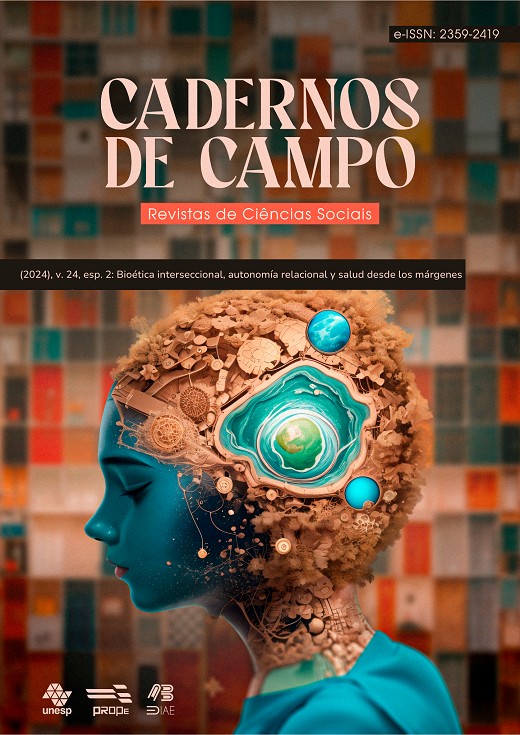Bioética interseccional. Perspectiva latinoamericana, descolonial y feminista
A Latin American, Descolonial and Feminist Perspective
DOI :
https://doi.org/10.47284/cdc.v24iesp.2.18990Mots-clés :
Interseccionalidad, Autonomía Relacional, Justicia Social, Reconocimiento, RedistribuciónRésumé
Para una ética social latinoamericana, que asume la tensión dialéctica entre condiciones de colonialidad y procesos de liberación, es posible incorporar problemas de reconocimiento y redistribución como criterios bioéticos capaces de combinación provechosa con los principios de autonomía y justicia, para ampliar sus significaciones en términos de autonomía relacional y justicia social, habilitando prácticas transformadoras. En el centro se encuentra la noción de interseccionalidad, cuya comprensión se tensiona entre dos direcciones del análisis: desde la redistribución o el reconocimiento. Con estos elementos organizamos una cartografía que permita avanzar en respuestas acerca de si la interseccionalidad resulta o no funcional al sistema en aquellos espacios donde emergen dilemas bioéticos; y si no lo es, ¿puede facilitar pista para avanzar en la transformación de las desigualdades?, y elucidar ¿qué tipo de justicia social se reclama en vistas a la inclusión participativa?; aún más ¿qué sombras proyectan estas formas de inclusión? En las conclusiones prevenimos acerca de caer en el uso meramente formalizado de la noción de justicia social interseccional, señalamos la necesidad de redefinir en términos políticos la interseccionalidad y la autonomía relacional y sugerimos su operacionalización en función de las necesidades de espacios de acción específicos.
Téléchargements
Références
ÁLVAREZ, S. La autonomía personal y la autonomía relacional. Análisis filosófico, [S. l.], v. 35, n. 1, p. 13-26, 2015.
ARPINI, A. M. Ética social. In: SALAS ASTRAÍN, R. (coord.). Pensamiento crítico latinoamericano. Conceptos fundamentales. Santiago de Chile: Ediciones de la Universidad Católica Cardenal Silva Henríquez, 2005. v. I, p. 327-339.
ARPINI, A. M. “A priori histórico / a priori antropológico. Notas para un diálogo posible entre Michel Foucault y Arturo Andrés Roig”. In: Tramas e itinerarios. Entre filosofía práctica e historia de las ideas de nuestra América. Buenos Aires: Teseo, 2020. p. 503-522.
ARPINI, A. M. “Entre distribución y reconocimiento. Reflexiones en torno al debate sobre justicia en salud pública”. Resistances, Quito, Ecuador, v. 2, n. 3, 2021.
ARPINI, A. M. Para la construcción del diálogo intercultural con mirada de género en bioética. Revista de Filosofía y Teoría Política, 2021.
BEAUCHAMP, T. L.; CHILDRESS, J. F. Principles of biomedical ethics. New York: Oxford University Press, 2001.
RODRÍGUEZ, J. D. Nuevas perspectivas bioéticas: autonomía relacional. Revista Ene de Enfermería, [S. l.], v. 6, n. 1, 2012.
KOTTOW, M. “Justificación por principios”. In: TEALDI, J. C. (dir.). Diccionario latinoamericano de bioética. Bogotá: UNESCO, Red Latinoamericana y del Caribe de Bioética, Universidad Nacional de Colombia, 2008. p. 141-144.
LUGONES, M. Colonialidad y género. Tabula rasa, [S. l.], n. 9, p. 73-102, 2008.
PAREDES CARVAJAL, J. E. Entronque patriarcal: la situación de las mujeres de los pueblos originarios de Abya Yala después de la invasión colonial de 1492. 2018. Tesis (Maestría) –, Facultad Latinoamericana de Ciencias Sociales, Buenos Aires, 2018.
QUIJANO, A. Colonialidad del poder, eurocentrismo y América latina. In: Cuestiones y horizontes: de la dependencia histórico-estructural a la colonialidad/descolonialidad del poder. Buenos Aires: CLACSO, 2014. p. 777-832.
RAWLS, J. Teoría de la justicia. Traducción: María Dolores González. México: Fondo de Cultura Económica, 1979.
ROIG. Teoría y crítica del pensamiento latinoamericano. México: Fondo de Cultura Económica, 1981. p. 9-17.
SEGATO, R. Género y colonialidad: del patriarcado comunitario de baja intensidad al patriarcado colonial moderno de alta intensidad. In: La crítica de la colonialidad en ocho ensayos. Y una Antropología por demanda. Buenos Aires, Prometeo, 2015. p. 69-99.
SEN, A. “Justicia global. Más allá de la equidad internacional”. Traducción del inglés por Carlos Rojas Reyes. polylog. Foro para filosofía intercultural 3. Global Public Goods. International Cooperation in the 21st Century. New York. Oxford: Oxford UniversityPress, 2001. p. 116-125.
SHERWIN, S. “Feminismo y bioética”. Programa Universitario de Estudios de Género, Universidad Nacional Autónoma de México, 2014.
SPIVAK, G. C. ¿Puede hablar el subalterno? Traducción de José Amícola y Marcelo Topuzian. Buenos Aires: El cuenco de plata, 2011.
TEALDI, J. C. Diccionario latinoamericano de bioética. Acta bioethica, [S. l.], v. 16, n. 2, p. 2, 2010.
Téléchargements
Publiée
Numéro
Rubrique
Licence
(c) Tous droits réservés Cadernos de Campo: Revista de Ciências Sociais 2024

Ce travail est disponible sous la licence Creative Commons Attribution 4.0 International .









